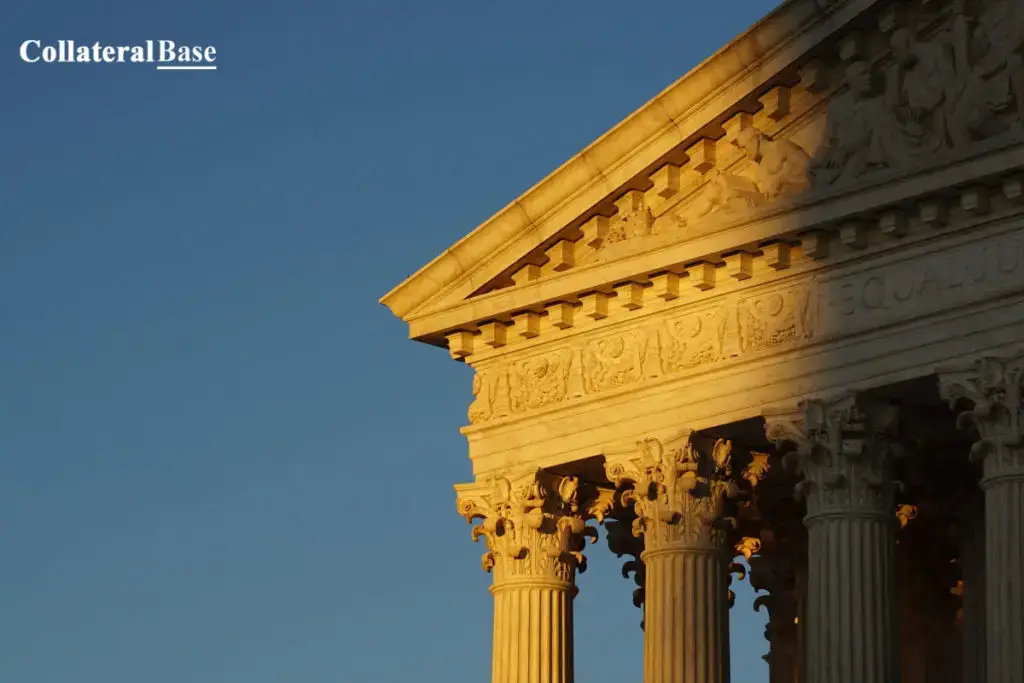
Cannabis Licenses and Due Process Protection
A cannabis license is a legal document that allows the licensee to engage in business in the legal cannabis industry of the state for which the license was granted.
Nowadays, such licenses are a highly valued commodity, with application fees costing tens of thousands of dollars, and in some cases, being able to sell them for millions of dollars.
In this sense, it is important to make a question about the type of rights that people have over these licenses. Specifically, the aim of this post is to answer whether a cannabis license can be considered a property interest, and thus, whether it can receive procedural due process protection.
What can be defined as property interest.
Property interest can be defined as the extent of a person’s or entity’s rights in property. The word “property” signifies a legal relationship between a person and an object.
To put it in even simpler terms, property interest is the right that a person has to control, sell, and/or transfer a property.
Further, according to the U.S. Supreme Court, property interests are “created and defined by existing rules or understandings that stem from an independent source such as state law – rules or understandings that secure certain benefits and support claims of entitlement to those benefits.” A constitutionally protected property interest must be an interest that is securely held, so that it is more than a mere expectation of an interest.
Attributes of property
Generally speaking, we can narrow down the attributes of property to three:
- Exclusive rights to determine the use of a resource.
- Exclusive rights to the services of the resource.
- Rights to exchange the resource at mutually agreeable terms.
However, determining whether a cannabis license can be considered property can be difficult. Like a tobacco or a liquor license, a cannabis license can’t be considered property right away, like a car or a house would be.
And, as mentioned above, property interests are defined by “existing rules or understandings that stem from an independent source such as state law – rules or understandings that secure certain benefits and support claims of entitlement to those benefits.”
In other words, whether a license is a property interest or not, will depend solely on the characteristics of the interest granted by a license in a particular state.
For this, we will focus on a slightly different set of attributes using the same model other authors have used to characterize an analogous commodity: liquor licenses. In this sense, liquor license has four attributes which delineate its property characteristics:
- Right to obtain
- Right to alienate
- Right to renew
- State’s right to revoke
These attributes will guide us on whether a cannabis license constitutes a property interest for purposes of procedural due process or takings challenges.
The right to obtain
The substantive conditions established in a state’s statutory framework for issuing licenses give birth to the right to obtain them. A license is not a property interest when a legislation lacks substantive criteria for determining when a license must be given. When the legislative framework establishes specific standards for choosing whether to issue a license, leaving the issuing authority with limited discretion, it establishes a constitutionally protected property interest.
When it comes to awarding licenses, states typically adopt one of four methods:
- The state issues a license to any applicant who meets the statutory qualifications. The statute clearly specifies that the license must be granted whenever the qualifications are met. In this case, the applicant’s expectations of receiving a license may create property interest. However, the mere application for a license does not create a property interest if the statute specifies that the license may be denied if certain qualifications are not met.
- The state has discretion determining how many licenses should be issued. Due to the limitations on the issuance, the licenses under this scheme have more property characteristics.
- The state limits the number of new licenses to a fixed statutory quantity. The numerical limits placed, tend to have more property characteristics than the two mentioned before.
- The state operates and/or does not license the private sector.
The right to alienate
This right is manifested when a state licensing legislation enables licensees to transfer licenses, and license holders can enter the market and earn fair market value for the property interest.
Federal courts have looked at the transferability and market value of licenses in determining whether state-created interests constitute property to which a federal tax lien attaches:
“[A] liquor license will constitute property, within the meaning of federal law [for I.R.S. purposes], if the license has beneficial value for its holder, and is sufficiently transferable.”
A transferable license possesses “intrinsic worth that is subject to bargaining and sale in the marketplace.” As a result, federal courts have considered transferable liquor licenses to be personal property in the past.
Different jurisdictions interpret the element of alienability and the related property interest in the license differently. This variation exists because a license might be deemed an asset for a variety of reasons. Some courts, for example, consider the license as a privilege in cases concerning the licensee’s connection with the government and as property in cases involving the licensee’s relationship with other parties such as creditors or heirs.
However, the monetary value created when a state allows the transfer of a license for compensation does not necessarily justify treating the license as property for all purposes.
The right to renew
The third attribute, the right to renew, may also create a property interest in the license.
The renewal process varies by state, and most licenses are only good for one year. Some states enable licensees to renew without submitting a formal reapplication.
These types of legislation provide strict standards for renewal and allow for renewal rejection only for “good cause.” In these jurisdictions, the licensee comes to assume that his or her license will be renewed automatically. The perpetual renewal procedures allow for shortened and accelerated review processes, as opposed to the strict procedures necessary for initial license granting.
In this sense, a perpetual license may be characterized as property due to the licensee’s entitlement to renewal.
Other states have a renewal system that requires holders to reapply for renewal each year. These statutes forbid the licensee from expecting automatic renewal. As a result, the licensee is denied the claim of entitlement required to elevate the license to the level of constitutionally protected property.
In jurisdictions that use a provisional renewal process, license holders have no reasonable expectation that their license would be recognized as property.
The state’s right to revoke
The fourth and final characteristic, the state’s authority to revoke, is derived from the limitations imposed by legislation on government activities in revocation proceedings.
Some states apply different due process standards for the issuance procedure and the revocation procedure. To cancel or suspend a license in Illinois, for example, due process requirements such as proper notice and an opportunity to be heard are required.
However, in this situation, no property right exists prior to the issue of a license in Illinois, and the application procedure should not be subject to any procedural due process protection.
In contrast, several jurisdictions apply the same due process criteria to both the issuing and revocation procedures. This amount of procedural protection afforded to the licensee during a revocation hearing is a strong indicator of whether the state views the interest as a vested property right or just an expectation of ongoing entitlement.
Although none of the aforementioned characteristics are required for a court to conclude that the license is a property right, their presence helps courts to conclude that the licensee’s interest in the license has reached to the level of a constitutionally protected property interest. These qualities may also have an impact on the due process protection necessary for any state action. The level of constitutional protection afforded to the applicant or licensee grows as the degree of property-like features increases.
RELATED: How to add a new member to an LLC
For a quick assessment of your needs – let’s talk to discuss how our firm can help your business.
Types of due process
Due process under the Fifth and Fourteenth Amendments can be broken down into two categories: procedural due process and substantive due process. Procedural due process, based on principles of fundamental fairness, addresses which legal procedures are required to be followed in state proceedings.
Relevant issues, as discussed in detail below, include notice, opportunity for hearing, confrontation and cross-examination, discovery, basis of decision, and availability of counsel.
Substantive due process, although also based on principles of fundamental fairness, is used to evaluate whether a law can be applied by states at all, regardless of the procedure followed.
Substantive due process has generally dealt with specific subject areas, such as liberty of contract or privacy, and over time has alternately emphasized the importance of economic and noneconomic matters. In theory, the issues of procedural and substantive due process are closely related. In reality, substantive due process has had greater political import, as significant portions of a state legislature’s substantive jurisdiction can be restricted by its application.
Procedural Due Process Protection
According to the Fourteenth Amendment, no state may “deprive any person of life, liberty, or property without due process of law.” The Due Process Clause entails procedural due process, which ensures proper notice, hearing, and an unbiased decision maker before the government deprives a person of certain protected interests.
Because licensing is regulated under statutory or constitutional provisions, a state or local agency’s refusal to issue licenses, or decisions to revoke or to transfer a license, is a state action which may trigger a claim that the licensee has been deprived of procedural due process.
However, due process protection against state action requires that the action impair a constitutionally protected “liberty” or “property” interest.
For those states which have not yet determined the level of due process required for licenses, an examination of the four property attributes discussed above will help determine the due process protection the state should provide the licensee, or potential licensee, either by judicial decision or legislative action.
There are three circumstances we need to have in mind regarding the extent of the procedural due process protection, namely:
1. Procedural Due Process Required Because the License is a Property Interest
If the licenses are considered property, then the states must offer complete constitutional protection. In this sense, a pre-deprivation hearing and chance to be heard must be provided whenever a licensee’s interest in the license is jeopardized.
To establish whether the license is a property interest, we must consider the four property interest attributes listed above.
2. Procedural Due Process Required by Type of Licensing Action at Issue and By Legislative Mandate
The majority of states give some due process protection by enacting legislation outlining the procedures that licensees must follow and distinguishing between various licensing acts such as issuance, renewal, and revocation.
Licenses may not reach to the degree of property necessary for the purposes of due process rights to be given. Many jurisdictions, however, provide limited due process protection for some license acts, such as renewal or revocation, by legislation or decision.
In the liquor industry, Georgia and Alabama are examples of states that provide due process protection by legislation. The legislature in Georgia established due process rules for the granting, rejection, suspension, or revocation of a liquor license, but declined to acknowledge the existence of a property interest in the license.
States may also grant limited due process protection through judicial decision. This protection may extend to some, but not all licensing actions.
A liquor license, for example, is not considered property under New Jersey law. This legislative declaration is supported by New Jersey case law, which holds that a liquor license is neither a contract or a property right, but rather a licence or privilege to engage in an otherwise illegal profession. Nonetheless, due process has been required in judicial judgments addressing federal matters.
3. Procedural Due Process Not Required Because License is Not a Property Interest
When a governmental action impacts a licensing interest, most states require licensees to be given some due process consideration. However, a state that refuses to offer such constitutional protection typically will do so because it refuses to recognize the license as a constitutionally protected property interest for the activity in question.
Determining when procedural due process rights are violated
Procedural due process is breached when a legislative procedure describing the process necessary for a licensing action is not followed, or when a court decides that appropriate notice and hearing have not been provided for an action affecting a protected property interest. Challenges to referendum procedures or local-option elections may likewise violate due process unless the court decides that the action is legislative in nature.
To determine when a procedural due process right has been violated, a court must first evaluate whether the license is a constitutionally protected liberty or property interest under the Fourteenth Amendment, and then assess whether the licensees have received the appropriate level of procedural due process.
Substantive Due Process
The presence of a property right is not required for substantive due process or equal protection. As a result, deciding whether a license is property is not required for assessing constitutional protection under these principles.
As applied to state or municipal regulatory activities, substantive due process guards against state action that is “arbitrary and unreasonable or without proper relation to the legitimate legislative purpose.” There must be a real and significant link between the rules imposed and the prevention of harm to the public’s moral, social, or economic well being.
In other terms: substantive due process is the notion that due process not only protects certain legal procedures, but also protects certain rights unrelated to procedure.
In this case, there are two major things you must look for:
- Did the government pass legislation?
- Does that legislation ban rights previously enjoyed by citizens?
If the answer to both is “yes”, we have a substantive due process problem. The resolution of that problem is that no law can be arbitrary. Any law that offends substantive due process must be analyzed by either:
- Strict scrutiny
- Rational basis test
Choosing which one to apply is based upon the nature of the right. If the right is a fundamental right, you must apply strict scrutiny, any other rights will be analyzed with the rational basis test.
In substantive due process actions, once the plaintiff proves that there is a law that is banning their rights, it is the government’s burden to prove that, if in fact it is interfering with a right, the law is necessary to achieve a compelling government interest.
Main difference between substantive and procedural due process
Substantive due process asks the question of whether the government’s deprivation of a person’s life, liberty or property is justified by a sufficient purpose, while procedural due process asks whether the government has followed the proper procedures when it takes away life, liberty, or property.
For advice on how you can protect your cannabis license, feel free to contact us, and also, visit our blog, Cannabis Industry Lawyer.
RELATED: What are valuation caps?
For a quick assessment of your needs – let’s talk to discuss how Trusts can help your business.
Whether this is your first land use issue or most recent, our office has helped people and businesses alike.
Thomas Howard was on the ball and got things done. Easy to work with, communicates very well, and I would recommend him anytime.





